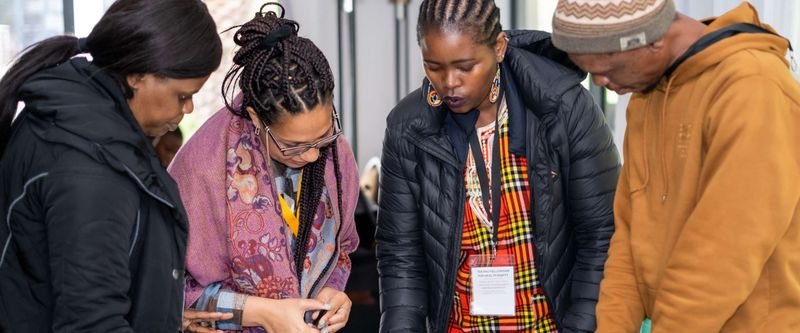Source: Africa Publicity
In the small village of Nkokonjeru in Uganda, a young girl named Amina woke up early each morning to help her mother fetch water from the nearby well. The water was not clean, but it was all they had. Amina’s younger brother, Kato, had been ill for several weeks, and their mother, Mariam, was deeply worried. She had heard of a health clinic in the next town that could help, but they had no way to get there.
Meanwhile, in Lagos, Nigeria, a man named Adewale was working tirelessly as a community health worker. His mission was to ensure that the residents of his neighborhood had access to basic healthcare. Adewale knew that many people in his community faced significant barriers to receiving care—some lacked the financial resources, while others were unaware of the services available to them. He often visited homes to provide vaccinations and educate families about hygiene and disease prevention.
A few thousand miles away, in the bustling city of Nairobi, Kenya, Dr. Njeri was leading a campaign to improve maternal health services. She had dedicated her life to reducing the high rates of maternal and infant mortality in her country. Dr. Njeri’s clinic offered prenatal and postnatal care to women from all walks of life, and she was constantly advocating for better resources and policies to support maternal health.
In the rural regions of Ethiopia, a boy named Tsegaye dreamed of becoming a doctor. He had seen too many of his friends and family members suffer from illnesses that could have been prevented or treated with proper medical care. Tsegaye studied hard at the village school, hoping to one day make a difference in his community.
Each of these individuals—Amina, Adewale, Dr. Njeri, and Tsegaye—lived in different parts of Africa, but they were all connected by a common goal: achieving health equity. Health equity, they believed, meant that everyone, regardless of their background or circumstances, had the opportunity to live a healthy life.
Amina’s story took a hopeful turn when an organization working in her region installed a new water filtration system in Nkokonjeru. The clean water drastically reduced the number of waterborne illnesses in the village, including Kato’s. The organization also provided transportation to the health clinic in the next town, ensuring that those who needed more specialized care could access it.
In Lagos, Adewale’s efforts were supported by a new government initiative aimed at improving primary healthcare. The initiative increased funding for community health workers and provided them with better training and supplies. Adewale was now able to reach more people in his neighborhood and offer a wider range of services. The community’s health improved significantly as a result.
Dr. Njeri’s campaign in Nairobi gained momentum when she partnered with international health organizations. They provided her clinic with modern equipment and supplies, as well as training for her staff. The government also took notice and began implementing policies to improve maternal health nationwide. Dr. Njeri’s tireless work led to a decrease in maternal and infant mortality rates, and more women received the care they needed.
In Ethiopia, Tsegaye’s dream of becoming a doctor became a reality when he received a scholarship to study medicine in Addis Ababa. After completing his studies, he returned to his village and opened a small clinic. Tsegaye’s clinic provided much-needed healthcare services to the rural community, and he worked to educate his neighbors about preventive care and healthy practices.
The journey to health equity in these African communities was not easy. It required the collaboration of individuals, organizations, and governments. It demanded a commitment to addressing the social determinants of health—factors like clean water, education, and economic stability—that significantly impact health outcomes. It also involved challenging systemic inequalities and advocating for policies that ensured everyone had access to healthcare.
Amina, Adewale, Dr. Njeri, and Tsegaye all played crucial roles in this journey. Their stories illustrated that health equity is achieved when everyone has the opportunity to attain their highest level of health. It means removing barriers to care, whether they are financial, geographical, or social. It means ensuring that healthcare systems are inclusive and responsive to the needs of all people, especially the most vulnerable.
In Nkokonjeru, Amina’s village flourished with the clean water system. The health of the villagers improved, and the children, including Amina and Kato, were able to attend school regularly. The community thrived as people were healthier and more productive.
In Lagos, Adewale’s neighborhood saw a dramatic decrease in preventable diseases. The residents were more informed about their health and had better access to services. Adewale’s work inspired many young people in the community to pursue careers in healthcare, creating a new generation of health advocates.
Dr. Njeri’s efforts in Nairobi transformed maternal health in Kenya. More women survived childbirth, and more infants lived to see their first birthdays. Dr. Njeri’s clinic became a model for maternal healthcare, and her advocacy led to national policies that prioritized women’s health.
Tsegaye’s clinic in rural Ethiopia became a beacon of hope. The community no longer had to travel long distances for medical care. Tsegaye’s dedication to his patients and his community’s well-being led to better health outcomes and inspired other young people to follow in his footsteps.
Health equity was not just a distant dream for these communities; it became a reality through hard work, dedication, and collaboration. It showed that when people come together to address health disparities, significant and lasting change is possible. Health equity is achieved when everyone, regardless of where they live or their socioeconomic status, has the chance to lead a healthy, fulfilling life.








